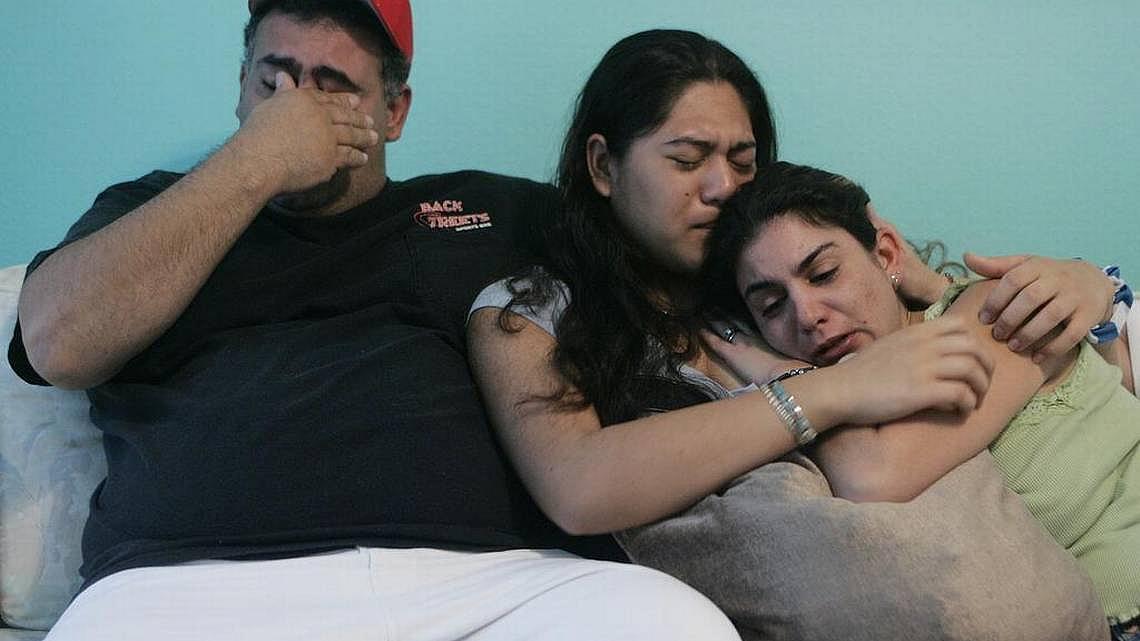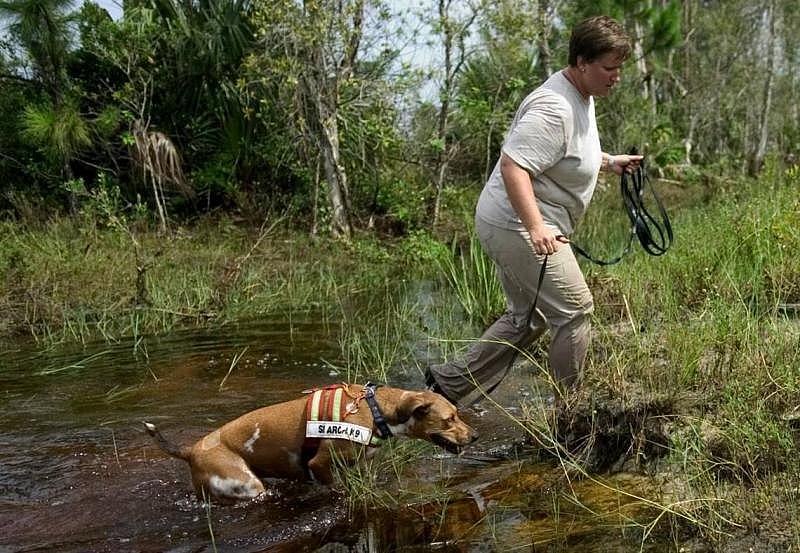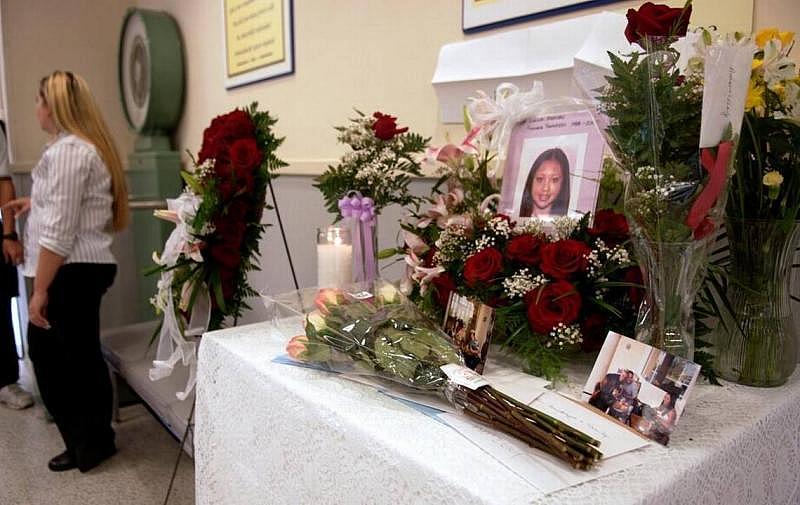Guard vowed to make a grieving girl’s life better. She says he did the opposite.
This article and others in this series were produced as part of a project for the University of Southern California Center for Health Journalism’s National Fellowship, in conjunction with the USC Annenberg School for Communication and Journalism.
Other stories in the series include:
Powerful lawmaker calls for juvenile justice review in wake of Herald series
Juvenile justice chief defends agency, calling abuses ‘isolated events’
An officer used a broom to beat juveniles into submission. They called it ‘Broomie.’
NAACP demands reform as lawmakers plan tour of lockup where youth was fatally beaten
Criminal record? Horrible work history? Florida juvenile justice would still hire you
At this juvenile justice program, staffers set up fights — and then bet on them
Dark secrets of Florida juvenile justice: ‘honey-bun hits,’ illicit sex, cover-ups
Lightning blasted his shoes off — and illuminated a pattern of abuse by staff
How small rebellions by Florida delinquents snowball into bigger beatings by staff
FIGHTCLUB: A Miami Herald investigation into Florida’s juvenile justice system

From left, father John Randazzo, Melissa Randazzo, 16, and aunt Kristin Zamzow break down during an interview in 2005 following the disappearance of Annamarie Randazzo. After Annamarie’s body was found, Melissa retreated into her marijuana pipe. John David Emmett The News-Press
By Carol Marbin Miller and Audra D.S. Burch
FORT MYERS — Melissa Rachael Randazzo was on probation for a marijuana charge when a detective delivered the awful news. A body believed to be that of her 17-year-old sister had been found burned and unrecognizable inside the charred shell of a junk refrigerator.
Randazzo, 16, reacted the way she always did to heartache. She lit the marijuana pipe.
That sent her back to the Southwest Florida Regional Juvenile Detention Center, where, she says, a three-week detention morphed into an eight-month confinement while she awaited a bed at a drug treatment center. As she waited, a 21-year-old officer befriended her. He knew of her recent tragedy. He wanted to make things better. They kissed. They touched, she said.
“He promised me the world. He promised he would give me my family back. He promised we would have a family of our own.”
She believed him.
After her release, Randazzo contacted Charles Nunez at an email address he gave her. Flirting led to dating, which led to intimacy, which led to the birth of Randazzo’s daughter, she told the Miami Herald in an interview. The messy romance ultimately spawned investigations by the Department of Juvenile Justice and the Fort Myers police, a marriage and divorce, and ugly court disputes over child support and custody, and domestic violence.
Melissa Randazzo said she entered the state’s juvenile justice system as a pothead trying to cope with unimaginable trauma — and exited as a pothead with a great deal of additional anguish.
Randazzo’s torment might have offered an object lesson about the dangers of allowing workers — some, like Nunez, not much older than their charges — to insinuate themselves into fragile young people’s lives. But lockup administrators missed the opportunity when they chose not to meaningfully investigate the relationship.
A killing and a marijuana charge
Annamarie Randazzo went to see the movie “Charlie and the Chocolate Factory” at a Cape Coral shopping center on July 21, 2005 — and vanished. Only her 1990 red and black Ford Mustang remained. It had been torched.
After searching a canal bank, Melissa Ellis leads cadaver dog Sasha across a waterway while searching for Annamarie Randazzo in areas adjacent to Burnt Store Road Friday, Aug. 5, 2005. Ellis teamed with a fellow volunteer from Bay Area Recovery K-9s to aid law enforcement in the search for the Cape Coral teenager. Stephen Hayford The News-Press
A counselor at an Arcadia drug treatment center saw a missing persons flier at a Publix supermarket about Annamarie’s disappearance and realized what her sister, Melissa, was going through. She arranged for Randazzo’s sentence to end three months early, and sent her home, Randazzo said.
“My dad and grandfather came to pick me up, and the whole ride home all they did was cry,” Randazzo recalls. “My father did not say anything. My grandfather did not say anything. I was going home to pretty much nothing.”
For two weeks, the family unraveled as they waited for news.
It came on Aug. 6, 2005. A detective told her father, John Randazzo, that a body had been found inside a charred, abandoned refrigerator. It was Annamarie.
John Randazzo wailed. Melissa found him curled up in a ball on the floor. “That’s when I knew she was dead,” Randazzo said in an interview.
Randazzo retreated into her marijuana pipe until she got caught again and returned to the Fort Myers detention center. “My sister was murdered, and they were going to lock me up because I smoked weed,” she said.
After her body was found, a memorial was set up for Annamarie Randazzo at the Publix in Cape Coral, where she’d worked. Her death left her sister, Melissa Randazzo, reeling. Amanda Inscore The News-Press
Randazzo said Charles Nunez recognized her immediately from the news stories. “After losing my sister, I was so hurt, and my family was falling apart,” she said. “He promised me better things, and I kind of believed everything.”
The two met in quiet places at the lockup, Randazzo told the Herald. They hugged and kissed, and touched softly, she said. When she left the detention center, he slipped her his email address.
A lockup colleague of Nunez’s reported to her bosses witnessing Randazzo and Nunez holding hands at a San Carlos movie theater on Feb. 17, 2007, an inspector general report said. Another officer saw the couple together at the Gulf Coast Town Center, Randazzo said.
It was about four months after Randazzo was released from a drug treatment program — and about the time she got pregnant.
Randazzo says she received a call from “the head guy” at the detention center, who told her he was recording the conversation, she said in the interview with the Herald. He asked if she and Nunez were in a relationship. Nunez, sitting next to her, told her to say no. “You don’t know me. You’ve never seen me,” she said he told her.
That March, an assistant superintendent asked Nunez if he’d been seeing the teenager, the inspector general report said. He denied it, but was restricted to no-contact with detainees on March 5, 2007. He quit the next day.
The probe ended with Nunez’s resignation.
Escape to Guantánamo
Court records say Nunez and Randazzo were married on April 11, 2007, and lived together at Randazzo’s mother’s home.
When he learned she was expecting a child, she said in court papers, Nunez offered to pay to terminate the pregnancy. She declined.
Days later, Randazzo said, Nunez told her he was going to get a haircut, then returned with enlistment papers. He was going to Guantánamo Bay. Nunez left the country and filed for divorce from Guantánamo.
The entire chapter, Randazzo said, was a stunning betrayal: “He lied to me. He used me.”
Randazzo’s daughter was born Dec. 14, 2007. Nunez submitted, then withdrew, a request for a paternity test. A judge ordered that his name be added to the girl’s birth certificate.
The divorce was granted on Oct. 28, 2008, but the turmoil continued for three more years. There were disputes over custody handoffs, contempt petitions, disagreements over child support, followed by more petitions. Nunez said Randazzo refused to allow him to see his daughter. The state suspended Nunez’s driver’s license when he failed to pay child support.
Three years later, in October 2011, Randazzo was granted a court order keeping Nunez away from her, citing domestic violence. In her petition, she said Nunez “made sexual advances” toward her at the Southwest Florida lockup while she was still grieving her sister’s death — then got her pregnant. She added he had “threatened to kill” every member of her family during a child-custody handoff.
That same month, DJJ completed its only investigation into the relationship, a probe begun in March 2011 when Randazzo contacted the agency. By then, there was powerful evidence of Nunez’s alleged misconduct: Randazzo still was under DJJ supervision until Oct. 2, 2007, the inspector general wrote, and the couple’s daughter was born only two months later.
DJJ substantiated an allegation that Nunez had maintained an “improper” personal relationship with Randazzo following her discharge from residential custody, but made no finding on Randazzo’s claim of sexual misconduct. The agency ruled “inconclusive” allegations that lockup administrators failed to act or report when they were first told, in 2007, that Nunez was in a relationship with a DJJ youth.
The lockup’s superintendent said he dropped an inquiry when Nunez resigned, and “didn’t take any further steps to determine whether there was a romantic relationship.”
Prosecutors concluded there was insufficient evidence to press criminal charges.
The Herald reached out to Nunez for comment, including through a different former wife, to no avail.
Randazzo said her life might have turned out differently had DJJ administrators done their job a decade ago when Nunez’s colleague first reported seeing him holding hands with a DJJ youth.
“Still, to this day, I have to deal with it,” she said. “They put me in a position to not be successful. I’m now a single mother, and that’s not easy. Life is very hard when you have a kid at such a young age.”
[This story was originally published by the Miami Herald.]

